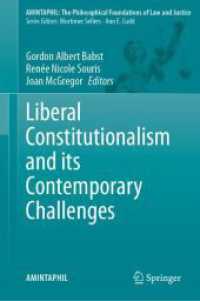- ホーム
- > 洋書
- > 英文書
- > Literature / Classics
基本説明
New in paperback. Hardcover was published in 2009. Now available in a new paperback edition, this collection has emerged out of the current re-evaluation of the vibrancy and centrality of the Romantic era novel.
Full Description
The British Romantic era was a vibrant and exciting time in the history of the novel. Yet, aside from a few iconic books -Pride and Prejudice, Frankenstein-it has been ignored or dismissed by later readers and critics. Bringing this rich but neglected body of works to the fore, Recognizing the Romantic Novel: New Histories of British Fiction, 1780-1830 challenges us to rethink our ideas of the novel as a genre, as well as our long-held assumptions about the literary movement of Romanticism. Ranging from pre-Revolution to post-Waterloo, this volume celebrates the experimental drive and revisionary spirit of the Romantic novel. With essays on authors ranging from Burney to Austen to Hogg, it argues that the Romantic-era novel can be understood as a field, not simply a heterogeneous mass of fictional forms-a field, furthermore, that can hold its own against more widely read eighteenth-century and Victorian novels. Eleven essays by prominent scholars in the field demonstrate that previously unexplored contexts can help us recognize even familiar Romantic-era novels in new and fuller ways. These essays thoughtfully explore such varied concerns as the critique of Enlightenment ideals, the close affiliation between poetry and prose, a fraught engagement with politico-ethical issues, the limits of our access to and understanding of the past, and a rethinking of communities outside the conventions of the marriage plot.
Contents
AcknowledgementsNotes on ContributorsPreface - Jillian Heydt-Stevenson and Charlotte Sussman1. `Launched Upon the Sea of Moral and Political Inquiry': The Ethical Experiments of the Romantic Novel - Jillian Heydt-Stevenson and Charlotte Sussman2. Bad Marriages, Bad Novels: The `Philosophical Romance' - Laura Mandell3. Enlightenment or Illumination: The Spectre of Conspiracy in Gothic Fictions of the 1790s - Markman Ellis4. Burney's Conservatism: Masculine Value and `the Ingenuous Cecilia' - Helen Thompson5. `All Agog to Find Her Out': Compulsory Narration in The Wanderer - Suzie Asha Park6. A Select Collection: Barbauld, Scott, and the Rise of the (Reprinted) Novel - Michael Gamer7. Austen, Empire and Moral Virtue - Saree Makdisi8. Fanny Price's British Museum: Empire, Genre, and Memory in Mansfield Park - Miranda Burgess9. Between the Lines: Poetry, Persuasion, and the Feelings of the Past - Mary Jacobus10. Scholarly Revivals: Gothic Fiction, Secret History, and Hogg's Private Memoirs and Confessions of a Justified Sinner - Ina Ferris11. Sympathy, Physiognomy, and Scottish Romantic Fiction - Ian DuncanWorks CitedIndex






